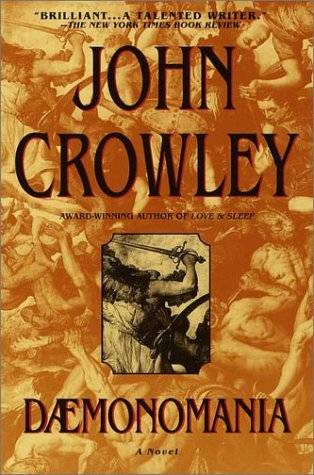

Daemonomania
by John Crowley
Our ReviewIn a perfect world, John Crowley would be universally recognized as one of our greatest living writers. His novels -- which include Little, Big, arguably the finest single volume fantasy of the past half century -- are intricate, beautifully composed creations that demand -- and repay -- repeated readings. We don't, of course, live in a perfect world, and so Crowley never has become a household name. He is, rather, the quintessential cult figure, the focal point of a relatively small, intensely devoted readership. His latest novel, Daemonomania, is unlikely to change this situation, but should provide the members of the Crowley cult with a legitimate, long-overdue reason to celebrate.Daemonomania is the third installment -- after Aegypt (1987) and Love and Sleep (1994) -- in a massive, multi-volume novel that has occupied Crowley for almost 20 years. This latest volume (whose title derives from a 16th century treatise on sorcery and demonic possession) once again explores the little/big dichotomy so central to Crowley's work, neatly juxtaposing the "ordinary" lives of an ongoing cast of central characters against the gigantic backdrop of an infinite -- and infinitely strange -- universe. As always in Crowley's fiction, the further in you go, the bigger it gets.A single, central conceit animates the entire sequence of novels: the notion that the universe itself is malleable, that each "World Age" is followed by a radically different age governed by radically different physical laws. An age dominated by magic can be followed by an age in which magic is -- and always was -- impossible. As each new epoch establishes itself, its past -- its history -- retrospectively realigns itself, conforming to the governing principles of the newborn age. Reality is -- sporadically, at least -- fluid, protean. And there is more than one history of the world.Daemonomania and its predecessors all take place in what Crowley calls a "passage time," a brief period of limitless possibility between the end of one age and the beginning of the next. In passage times, the old rules -- the old limits -- sometimes give way, and certain individuals can comprehend -- and perhaps even influence -- the changes taking shape around them. One such individual is Pierce Moffett, the failed lover, failed teacher, and failed historian who stands at the center of this vast complex of interconnected narratives.Pierce is, among other things, a seeker after Meaning. Early in the opening volume, he leaves his home in New York City and moves to the mythical, bucolic Faraway Hills, where he begins to write a pseudo-scholarly study of the various superstitions and systems of belief that have arisen throughout history. Once settled in his new home, Pierce finds himself caught up in a vast, ongoing Story that seems (maybe, possibly) to have been waiting just for him. Some of the stories nested within that larger Story concern the troubled lives and evolving relationships of Pierce's neighbors. Other stories concern older, more arcane matters, matters that Pierce -- by virtue of his peculiar past and eccentric erudition -- finds strangely, teasingly familiar.The story begins in earnest when Rosie Rasmussen, another troubled seeker, hires Pierce to sort through the posthumous papers of Fellows Kraft, a once popular historical novelist who was one of the iconic figures of Pierce's childhood. Among these papers is an unfinished, perhaps unfinishable novel called Aegypt, which is set amidst the pervasive strangeness of 16th century Europe, an earlier World Age just then entering its own turbulent passage time. Kraft's novel follows the parallel, occasionally intersecting paths of two Renaissance mages, John Dee and Giordano Bruno. The world these men inhabit -- a world filled with angelic visitations and impossible acts of magical transformation -- contains numerous, subtle reflections of the late 20th century, a world that is itself (maybe, possibly) heading toward a moment of fundamental, irreversible change.As Daemonomania shuttles back and forth between one age and another, one story and another, the tone of the narrative grows perceptibly darker. John Dee descends into a lonely old age marked by poverty and neglect, while Bruno -- a notorious heretic -- moves toward his inevitable -- and fatal -- encounter with the Roman Inquisition. Meanwhile, in the later, very different world of the Faraway Hills, Pierce struggles to survive a doomed, lacerating love affair; Rosie Rasmussen struggles with her daughter's illness, and with the competing custody claims of her estranged husband; and an ominous, seductive religious cult (The Powerhouse) gradually establishes a foothold in the community. As these events -- and others -- move slowly toward their various resolutions, a very literal wind of change blows through the novel, rearranging the world into a new -- as yet unglimpsed -- configuration.This huge, ambitious novel -- which still has one volume to go -- is erudite, wonderfully well written, and endlessly fascinating. It works, with equal facility, on a number of levels: as a meditation on the nature of magic, and on the magical power of love and memory; as a corollary meditation on the endless human yearning for meaning and coherence; as a vast, metaphysical speculation on the nature and progress of human history; and as an equally vast metaphor for the nature and progress of the individual life. The result of all this is a dense, sometimes daunting work that is clearly not for everyone. But readers who approach these books with patience, energy, and openness of spirit will find themselves enriched, enlivened, and possibly even enlarged. Daemonomania -- together with Aegypt, Love and Sleep, Engine Summer and Little, Big -- has found a permanent place on my personal shelf of important, enduring novels. I hope it finds a similar place on yours.| --Bill Sheehan
Release Date:
June 25, 2001

